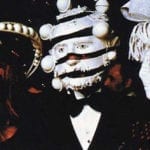 Miscellaneous
Miscellaneous  Miscellaneous
Miscellaneous  Gaming
Gaming 10 Funny Tutorials in Games
 History
History 10 Fascinating Little-Known Events in Mexican History
 Facts
Facts 10 Things You May Not Know about the Statue of Liberty
 Movies and TV
Movies and TV 10 Movie Adaptions That Brought Popular Songs to Life
 Health
Health 10 Miraculous Advances Toward Curing Incurable Diseases
 Miscellaneous
Miscellaneous 10 Undeniable Signs That People’s Views of Mushrooms Are Changing
 Animals
Animals 10 Strange Attempts to Smuggle Animals
 Travel
Travel 10 Natural Rock Formations That Will Make You Do a Double Take
 Movies and TV
Movies and TV 10 Actors Hidden in Your Favorite Movies
 Miscellaneous
Miscellaneous 10 Interesting Things Manufacturers Stopped Making and Why
 Gaming
Gaming 10 Funny Tutorials in Games
 History
History 10 Fascinating Little-Known Events in Mexican History
Who's Behind Listverse?

Jamie Frater
Head Editor
Jamie founded Listverse due to an insatiable desire to share fascinating, obscure, and bizarre facts. He has been a guest speaker on numerous national radio and television stations and is a five time published author.
More About Us Facts
Facts 10 Things You May Not Know about the Statue of Liberty
 Movies and TV
Movies and TV 10 Movie Adaptions That Brought Popular Songs to Life
 Health
Health 10 Miraculous Advances Toward Curing Incurable Diseases
 Miscellaneous
Miscellaneous 10 Undeniable Signs That People’s Views of Mushrooms Are Changing
 Animals
Animals 10 Strange Attempts to Smuggle Animals
 Travel
Travel 10 Natural Rock Formations That Will Make You Do a Double Take
 Movies and TV
Movies and TV 10 Actors Hidden in Your Favorite Movies
10 Controversies from Recent World Cups
This is a list of incidents at recent World Cup tournaments that were ugly, unfortunate, unlucky or unwarranted. Put simply, these are the stories of the World Cup that leave a bad taste in your mouth. I have only considered the last three tournaments (France ’98, Japan & South Korea ’02 and Germany ’06) which were played under the modern-day format of 32 teams in 8 groups. The reason for this is two-fold; primarily, I wanted the average reader under 30 to be able to remember and relate to the incidents listed here. Secondly, were it not for the excluded tournaments, the list would simply be too big. The World Cup has a rich and colorful history that dates back to the 1930’s, and I felt that an attempt to condense this historical mass into one single list would detract from its depth and cultural significance.
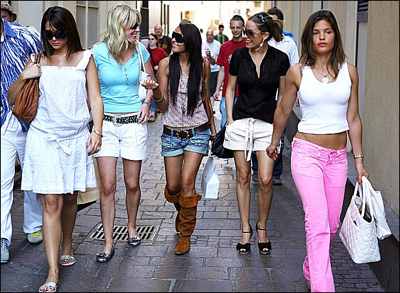
We’ll kick off this list with a sad, and pathetic, subculture that rears its ugly head whenever England play a major international tournament. At World Cup 2006, the WAGs – wives and girlfriends – of the England players had a grand old time. The England manager, Sven Goran Eriksson, had allowed the WAGs to travel to the tournament and spend time with the players in between training and matches. These WAGs are extremely wealthy as some of their partners were earning upwards of one hundred thousand pounds a week.
The WAGs turned England’s World Cup experience into an absolute circus. We were constantly bombarded by the tabloids with images of Victoria Beckham and co, dripping with jewelry and designer clothes, dragging their entourage of paparazzi all over quaint little German towns, like Baden Baden. It was distracting for the players, distasteful for the fans and detracted from the football showpiece that is the World Cup.
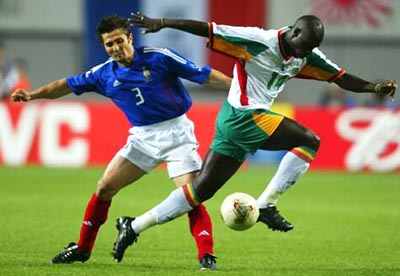
This is probably only an unsavory event for the France fans out there. For the rest of us, it certainly qualifies as unexpected. Leading up to World Cup 2002, the French team were on top of the world. They were the current World Cup champions having won in France in ’98, and the current European Champions, having won at Euro 2000. In David Trezeguet and Thierry Henry they had two of the top strikers in the world, who were scoring goals for their clubs like it was going out of fashion. France had an eminently winnable group that included Uruguay, Denmark and World Cup debutants Senegal. Heavily installed as pre-tournament favorites, the only blemish on the French preparation was an injury to Zinedine ‘Zizou’ Zidane, that saw him unable to play in their first two matches.
Senegal shocked France with a 1-0 win in the first match – one of the biggest upsets in World Cup history. France were then held to a goalless draw by Uruguay in game two. Zidane, the heartbeat of the French side, was rushed back from injury to play in the third match against Denmark, but was not fully fit and was ultimately unable to prevent a 0-2 loss. France were eliminated in the group stages, losing all three matches and not even scoring a single goal – thus completing the worst defense of the World Cup in history.
A memorable incident was when Trezeguet, after a number of near-misses by the French team, hit the crossbar with a shot in the third match. He put his hands on his hips, shook his head and stared at the heavens incredulously, rueing their incredibly bad luck. Later, when questioned on France’s terrible performance, Thierry Henry blamed is on the injury to Zidane, remarking “it was because we didn’t have Zizou”.
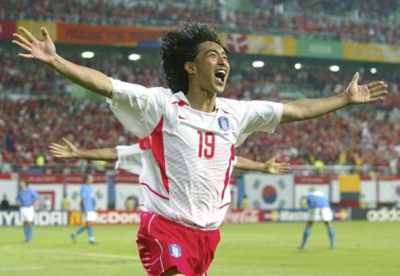
One of the most incredible fairy-tales of the World Cup is South Korea’s unexpected charge to the semi-finals at World Cup 2002. Along the way, they claimed some high-profile scalps, the first of which was Italy in the knock-out round of 16. The match was highly controversial in terms of refereeing decisions – the Italians were probably entitled to feel somewhat hard-done-by. Whatever, this is the nature of football.
South Korean, Ahn Jung-Hwan, scored the extra-time goal that sealed the fate of the Italians. At the time, Jung-Hwan’s club team was Italian side Perugia. After scoring the golden goal to knock Italy out of the World Cup, Jung-Hwan was sacked by Perugia. The owner, Luciano Gaucci said, “That gentleman will never set foot in Perugia again. He was a phenomenon only when he played against Italy. I am a nationalist and I regard such behavior not only as an affront to Italian pride but also an offense to a country which two years ago opened its doors to him. I have no intention of paying a salary to someone who has ruined Italian soccer.”
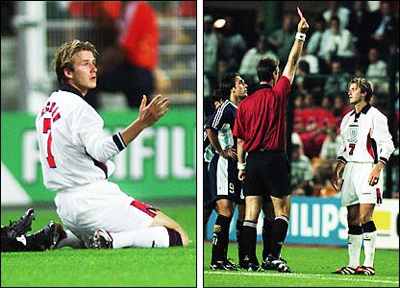
At World Cup 98 England were pitted against arch-nemesis Argentina in the knock-out round of 16. Early in the second half, David Beckham was felled by Argentinian Diego Simeone in a certain yellow-card offense. However, as Beckham was lying on the floor, he kicked out at Simeone in retaliation, triggering an instant (and warranted) dismissal. England would have to play out the rest of the match with only ten men and, after a gallant effort, would eventually go out on penalties.
The unpleasantness of this incident was the treatment of Beckham in the weeks and months hence. The English press needed a scapegoat and were baying for his blood. A long period ensued where Beckham was mercilessly pilloried in the papers across the nation. He spent the remainder of the close season in the United States for fears of his personal safety. There were attacks on his home, vitriolic hate mail and even burning effigies. Football can bring joy and happiness to all corners of the globe, but it is sad that it can also generate this level of hatred and revulsion.
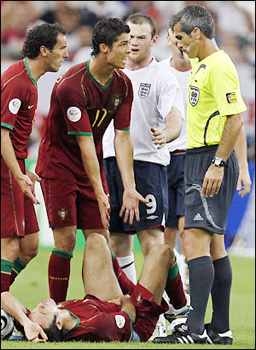
World Cup 2006 saw England play Portugal in the quarter finals – something of a grudge match, as Portugal had beaten England on penalties at the last European Championships in 2004. England talisman Wayne Rooney has something of a fiery temperament, and this was especially obvious in his more tender years. Being a die-hard England fan, I was getting more and more nervous as the game progressed, and Rooney became visibly more frustrated by the minute. He was starved of service from the English midfield, who just didn’t seem to be able to string passes together. He was also getting close physical attention from the Portuguese defenders, and was leading the line by himself – deployed as the only striker in a 4-5-1 formation. Rooney was starting to boil, and every England fan knew it was only a matter of time before he lost his cool, which he duly did in the 62nd minute by stamping on Portugese defender Ricardo Carvallho.
But it’s not Rooney’s foul that makes this list – which was stupid and borne of frustration, rather than dangerous and borne of malice – it is the actions of his Manchester United team-mate. Cristiano Ronaldo, playing in the Portuguese midfield, sprinted some 40 yards to remonstrate vigorously with the referee following Rooney’s foul. Surrounded by three or four shouting Portuguese players, the referee duly red-carded Rooney and sent him off. Directly after the incident, Ronaldo winked towards his bench, sending the UK media into an uproar. The wink suggested “mission accomplished” – that the Portuguese had been planning on goading the notoriously hot-tempered Rooney, with close attention and underhand off-the-ball contact in a bid to get him sent off. To do this to a close club team-mate made it particularly unpalatable on Ronaldo’s part.
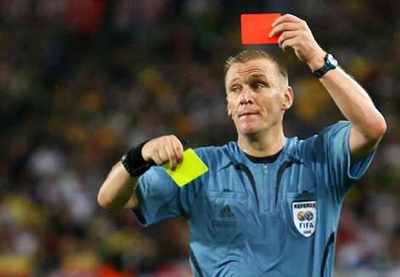
At World Cup 2002, the last Group F match between Australia and Croatia was refereed by Englishman Graham Poll. He had a wealth of experience in the English Premier League, and took control of many of the high-profile matches. As testament to his ability, Poll was selected as England’s representative at two World Cup tournaments, and one European Championship.
Poll had successfully refereed two matches at World Cup 2002, and the marks that he received from the assessors indicated that he was in with a very good shout to take charge of the final, a fact he laments in his autobiography. It all went pear-shaped for Graham in the Australia-Croatia group match, when he inadvertently issued three yellow cards to the same player before sending him off.
When Poll issued a second yellow card to Croatian Josip Simunic, he inadvertently noted down the name of the Australian number three Craig Moore – failing to send Simunic off. Simunic continued to play for some time, before committing another transgression and being issued a third yellow card (which Poll thought was his second) and finally being sent off. This is probably the highest-profile, and most blatant, refereeing blunder in World Cup history, and it’s a dreadful shame that it had to happen to such an experienced, and otherwise excellent, referee in his final showing at an international tournament.
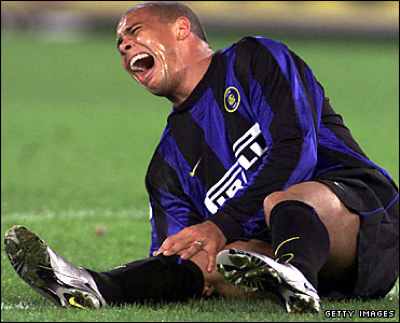
At France ’98 Ronaldo was the world’s most recognizable footballer. Prior to the World Cup, he had signed a monumental sponsorship deal with sports giant Nike, and became the first globally mass-marketed footballer on the planet (yes, even pre-dating the meteoric rise of brand Beckham). Maybe its the cynic in me but I seemed to notice that at France ’98, every time he went down after a foul, the close-up camera shot that followed (being beamed all over the world) always had his hands strategically clutching his leg directly beneath the Nike symbol on his shin-pads. Whatever, the events before the final in Paris would go down in World Cup folklore.
On the morning of the day of the final, rumors began circulating in the press that Ronaldo was violently sick the night before and would be unable to play. As the speculation worked up to fever pitch, almost every manner of illness was reported, and even wild conspiracy theories were dreamed up, involving french secret service agents dressed as bellhops slipping something into his food (Brazil were to play France in the final).
Sure enough, when the Brazilian team released their team sheet less than two hours before the final, Ronaldo was excluded. Predictably, this sent the media into a frenzy which only relented some thirty minutes before the final, when the team sheet was changed and Ronaldo was included. Brazil would lose the final 3-0, and Ronaldo was a shadow of the player that had scored four goals in the tournament, thus far. He looked jaded, tired and his play was just…well, just not Ronaldo.
After all the furore died down, the accepted explanation is that he suffered a convulsive fit, resulting in his exclusion from the line-up. Ronaldo says that his late inclusion was at his own request. A prevalent alternative explanation (or conspiracy theory, as the case may be) is that his late inclusion was at the behest of Nike who – unable to bear the scenario of their most significant footballing investment not playing in the World Cup final – applied intense pressure to force his inclusion. Given how much money is in football, this is certainly not beyond the realms of possibility.
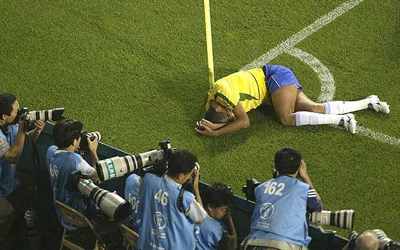
At World Cup 2002 in the group match between Brazil and Turkey, Rivaldo indulged in some Oscar-worthy play-acting. In the closing stages of the match the ball went out of play and Brazil were awarded a corner. Rivaldo stepped up to take it and motioned for the ball. Instead of amicably rolling it over to him, Turkish defender Hakan Unsal spitefully booted it directly at him. The ball clearly struck Rivaldo on the thigh but in a bid to mislead the referee, he sank to the ground clutching his face, moaning and writhing in pain. Unsal was sent off with a second yellow card.
Without condoning Unsal’s childish petulance, Rivaldo’s behavior is exactly what we don’t need defacing the beautiful game. Diving, simulation, play-acting – whatever you want to call it – is just plain cheating, and is absolutely disgraceful. Rivaldo was fined by FIFA for his antics, but I personally feel that incidents such as this should be much more harshly punished. A three match suspension would make any player think twice about cheating.
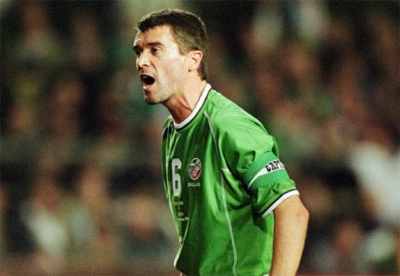
Talismanic Ireland captain, Roy Keane, was a footballing ‘hard man’ – an aggressive, passionately-driven midfielder with an explosive temper. He could have one hell of a row and would never back down.
Upon arrival at the Irish base camp for World Cup 2002, Keane was extremely unimpressed with the facilities and team management. Following a massive argument with manager Mick McCarthy, Keane withdrew from the squad and went home. Ireland went on, without their captain, to do exceptionally well at the World Cup. How much further could they have gone if Keane had stayed? Well, that was the speculation that was always going to hang over them, such is the respect afforded Keane as a footballer.
Keane’s actions polarised opinions in his native country, and across the globe. His supporters say that he was absolutely right to stand up for his principles, and point out a deep-seeded amateurism in the Irish Football Association. His detractors say he unforgivably turned his back on his country. Personally, I agree with Piers Morgan of ‘The Daily Mail’ who contends Keane is a “humorless, nasty, violent, foul-mouthed, selfish, disloyal thug who resides on a Citizen Kane-style pedestal of egotistical, lonely, unjustified self-adoration.”
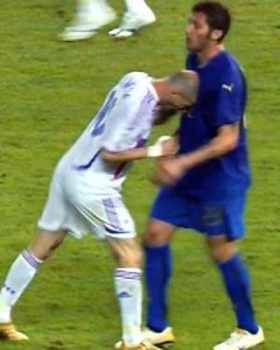
Zinedine Zidane was, arguably, the finest footballer of his generation, and will go down in history as one of the greatest to have ever played the game. The French team were struggling to qualify for Germany ’06 when coach Raymond Domenech urged Zidane to come out of international retirement to help the team. With their captain reinstated, France went to the World Cup and performed brilliantly. To cap off his extraordinary career with another World Cup winners medal would have been a fairy-tale ending for Zidane.
However, he would end up tainting his reputation after a moment of sheer madness in the dying minutes of extra time in the final against Italy. Zidane was sent off for a violent headbutt to the chest of Italian defender Marco Materazzi. Though the incident occurred off the ball, it was squarely captured on camera and replayed all over the world for weeks and months to come. There followed much speculation in the press as to what Materazzi must have said to prompt the assault. After months of silence from both parties, Zidane (and later, Materazzi) came out and clarified the situation.
Frustrated at being marked so closely by Materazzi, Zidane made the sarcastic remark: “If you want my shirt so badly, I’ll give it to you after the match”. Materazzi replied “I’d prefer your sister” and the rest is history.
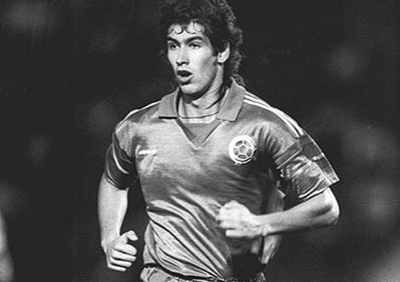
This incident did not occur at any of the three most recent World Cups – it occurred after World Cup 1994 in the USA. However, I felt it had to be included because it is probably the most despicable and audacious act of cruelty that the game of football is unfortunate enough to be linked to. Andres Escobar was playing for Colombia against the United States in their second group match, when he inadvertently deflected the ball into his own net, scoring an own goal. The USA would win the match 2-1, resulting in Colombia being eliminated from the tournament.
Less than a fortnight later, Escobar was shot outside a Medellin night club and died of his injuries. The killer shouted “Goal!” for each of the twelve shots fired.






